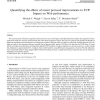Free Online Productivity Tools
i2Speak
i2Symbol
i2OCR
iTex2Img
iWeb2Print
iWeb2Shot
i2Type
iPdf2Split
iPdf2Merge
i2Bopomofo
i2Arabic
i2Style
i2Image
i2PDF
iLatex2Rtf
Sci2ools
119
click to vote
COMCOM
2006
2006
Quantifying the effects of recent protocol improvements to TCP: Impact on Web performance
We assess the state of Internet congestion control and error recovery through a controlled study that considers the integration of standards-track TCP error recovery and both TCP and router-based congestion control. The goal is to examine and quantify the benefits of deploying standards-track technologies for contemporary models of Internet traffic as a function of the level of offered network load. We limit our study to the dominant and most stressful class of Internet traffic: bursty HTTP flows. We find that for HTTP flows (1) using SACK only improves performance for larger-than-typical HTTP transfers, (2) unless congestion is a serious concern (i.e., unless average link utilization is approximately 80% or higher), there is little benefit to using RED queue management, (3) above 80% link utilization there is potential benefit to using Adaptive RED with ECN marking, however, complex performance trade-offs exist and the results are dependent on parameter settings.
Related Content
| Added | 11 Dec 2010 |
| Updated | 11 Dec 2010 |
| Type | Journal |
| Year | 2006 |
| Where | COMCOM |
| Authors | Michele C. Weigle, Kevin Jeffay, F. Donelson Smith |
Comments (0)

